
Alphabetical Menu
Chronological Menu
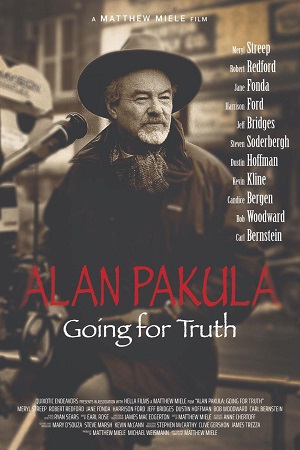
Alan Pakula: Going for Truth is a thoroughly engaging documentary of filmmaker Alan J. Pakula who died in a tragic accident in 1998. Through archival footage, interviews with his family and the people who were lucky to work with him, director Matthew Miele captures what Pakula was like as a film director as well as a human being. He was a true humanist with compassion and empathy for others which he displayed both on and off the set. Interviews with Meryl Streep, Robert Redford, Jane Fonda, Jane Alexander and many more provide plenty of insight about their experiences working with Pakula and what made him such an exceptional filmmaker. Harrison Ford even tears up at one point as he talks about Pakula, so you can palpably feel how much he missed, reveres and appreciates him at that particular moment that transcends words. There's also a lot of fascinating analysis of clips from Pakula's movies like Sophie's Choice, All the President's Men, Presumed Innocent, The Pelican Brief and many more which will help you to see those movies in a whole new perspective. For example, the scenes in the newspaper office in All the President's Men are brightly lit with no shadows, but the scenes at other locations are lit differently with shadows present. Pakula's visual style is a form of poetry. You'll also grasp what makes Pakula stand out as a filmmaker and distinguishes his films from the films of today. Alan J. Pakula had the courage to make dark films for intelligent, grown-up audiences. That's something that's sorely missing from modern studio films, so it's a real pleasure to hear actors reminiscing about their time working on Pakula's films. Meryl Streep candidly and perceptively explains how the younger generations of today remember her from The Devil Wears Prada and from Mamma Mia!, but they rarely know her from Sophie's Choice. This documentary will inspire you to watch Pakula's films for the first time or to rewatch them. Director Matthew Miele deserves to be commended for finding just the right balance between entertaining the audience and provoking them emotionally as well as intellectually. Never does the doc become dry, dull or make you tempted to ask, "When is the exam??" At a running time of 1 hour and 38 minutes, Alan Pakula: Going for Truth is a captivating, illuminating and well-edited documentary. It opens at Angelika at Village East. FYI, next week there's a taut, slow-burning Pakula-esque crime thriller called Black Box opening at the same theater. The Bad Guys 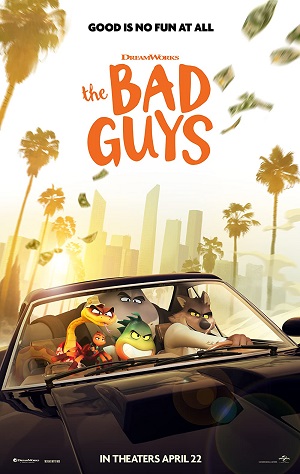 A group of outlaws, Wolf (voice of Sam Rockwell), Snake (voice of Marc Maron), Shark (voice of Craig Robinson), Tarantula (voice of Awkwafina), and Piranha (voice of Anthony Ramos), successfully pull off a bank heist and make off with the money after a long chase with the police. That feat isn't enough for them, though, so they set their sights on a new crime mission. They want to steal the award given to Professor Rupert Marmalade (Richard Ayoade), a guinea pig, presented to him at a ceremony for his humanitarian work. Their mission doesn't go as planned, but before they're taken away to prison, Governor Diane Foxington (Zazie Beetz) strikes a deal with Wolf that if he and his gang of outlaws can become good guys, they won't go to prison. Wolf and his gang, instead, merely pretend to be good while still trying to steal Professor Rupert Marmalade's precious award. The screenplay by Etan Cohen and Hilary Winston is occasionally witty with some visual gags, but at times it resorts to the lowest common denominator through fart jokes that aren't very funny. The plot twists, of which there are many, are more fun than surprising, though. Fortunately, the film doesn't take itself seriously, so even when it does go over-the-top toward the end, it still entertains. A scene involving Wolf trying to rescue a cat lasts a little too long, but it's quite funny for the most part. The villains aren't very threatening; even the tarantula won't scare those of you with arachnophobia. It's a lot of fun to watch them together, especially when Wolf tries to con the Governor. As for the film's message of good and evil, it does get preachy very briefly about the value of being good, but it's an important lesson for kids to learn even though it's oversimplified. The CGI animation provides plenty of eye candy with good use of color and facial expressions that bring the animated characters to life. The voice acting is well-chosen too. Sam Rockwell sounds a lot like George Clooney which is probably not a coincidence. When it comes to pacing, that's where the film is a bit weak because it often moves at a very quick pace as though the filmmakers assumed that the audience has a short attention span. There are a lot of car chases, almost as many as in The Fast and the Furious and Ronin, even, so if you're looking for palpable thrills, you won't leave disappointed. The best way to describe The Bad Guys is that it's like a lighter, comedic version of Ocean's 11 or a family-friendly Dirty Rotten Scoundrels. It's not quite as brilliant and funny as Megamind, though, but at least it's 20 minutes shorter than the overlong, 2-hour Sonic the Hedgehog 2. At a running time of 1 hour and 40 minutes, The Bad Guys is a pleasant, fun and amusing animated crime caper for everyone, young and old. 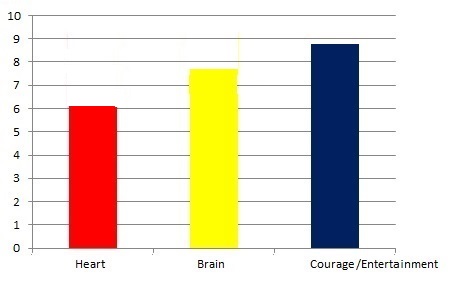 Charlotte  Charlotte Salomon (voice of Keira Knightly), a German-Jewish painter, painted over 700 paintings before getting murdered at an Auschwitz concentration camp during World War II. Until then, she lived in Berlin with her father, Albert (voice Eddie Marsan) and stepmother, Paula (voice of Helen McCrory), and met the first love of her life, Alfred Wolfsohn (voice of Mark Strong), who encouraged her to keep painting. As the Nazis' power began to rise, she fled to France to live with her grandma (voice of Brenda Blethyn) and grandpa (voice of Jim Broadbent) while falling in lover with the second love of her life, Alexander (voice of Sam Claflin). Charlotte tells the true story of an artist who followed her passion for painting even during times of adversity. The screenplay by Erik Rutherford and David Bezmozgis follows the experiences of Charlotte from 1941 to 1943, but they shy away from dwelling too much on the tragic events from her life and from the horrors of the war. Charlotte's death, for example, remains off-screen. Unfortunately, the filmmakers don't slow down enough to show Charlotte's inner life; they're too concerned about moving the plot forward from point A to point B. Charlotte has certainly been through a lot on many levels, especially emotionally and psychologically, throughout the film, so to put that on the backburner dehumanizes Charlotte to the audience. She's a strong woman and also very brave which makes her a good role model. Her sorrow and emotional pain can be felt slightly, though, as she deals with the rise of the Nazis in Germany and has to start a new life in France, but what about her adjustment to the new life? How does she feel about it? It could've been easy for her. Nonetheless, her love for creating art and channeling her feelings through her paintings brings some much-needed poignancy and depth to the film that's not found within the rather by-the-numbers screenplay. The hand-drawn, 2D animation style adds warmth, but it doesn't rise to the level of awe-inspiring or breathtaking quality found in other animated films that deal with serious subject matters like Flee or Chico & Rita. The animation of Charlotte's face in particular lacks enough expressiveness to bring her to life. Perhaps Charlotte can best be compared to last year's live action When Hitler Stole Pink Rabbit which also didn't show the horrors of the Holocaust, but at least that film was more emotionally engrossing than Charlotte. At a brief running time of 1 hour and 33 minutes, Charlotte is mildly engaging and occasionally moving, but it's often dull while failing to humanize Charlotte Salomon enough to pack an emotional punch. 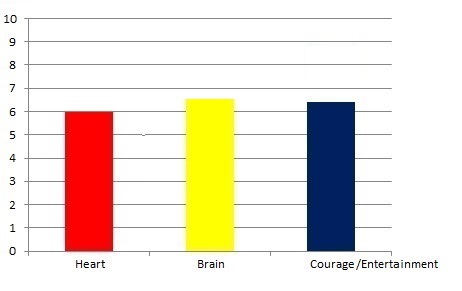 The Duke  Kempton Bunton (Jim Broadbent), a retired cab driver, lives in Newcastle with his wife, Dorothy (Helen Mirren), and sons, Jackie (Fionn Whitehead) and Kenny (Jack Bandeira), while writing screenplays on the side. He steals Goya’s portrait of the Duke of Wellington from the National Gallery to shed light on his political point about the government's waste of taxpayer's money and to promote his belief that all senior citizens should receive free TV licences. Based on an incredibly true story, The Duke manages to be just as sweet, funny and delightful as Saving Grace and Ealing Studios' classic comedies from the Golden Age of British Cinema during the 40's and 50's. Kempton remains endearing despite his flaws and the fact that he went to prison twice. Once for failing to pay his TV licence fees and again for the theft of the Duke of Wellington painting. Although The Duke does have a heist scene, it's not really that nor is it a heist film. The witty screenplay by Richard Bean and Clive Coleman sets the comedic tone right away during the first few minutes as Kempton pleads not guilty over and over in court to the charges related to the heist before flashing back to show how he ended up in court. There are a few surprises and twists along the way which won't be spoiled here, and it would be best if you don't know about the true story of Kempton Bunton beforehand. The Duke excels at knowing precisely when to take itself seriously and when not to. The courtroom scenes are amusing and veer toward parody without going over-the-top. The lengths that Kempton goes to stand up for what he believes in is up for debate, but The Duke doesn't ask you to judge him, just to experience him. Cut from the same cloth as Daniel Blake from Ken Loach's sociopolitical I, Daniel Blake, he comes across as a kind-hearted, compassionate and intelligent human being despite his brushes with the law. Jim Broadbent and Helen Mirren are both terrific as Kempton and Dorothy Bunton. They bring tremendous charisma, warmth and tenderness to their roles while finding the emotional truth of the characters. They breathe life into their roles with pure, unadulterated naturalism. There's no hammy or stilted performance throughout the entire film, and Fionn Whitehead is also very well-cast as the one of Kempton's sons. The film moves along briskly enough without a dull moment. Director Roger Michell knows how to edit The Duke to make it cinematic, yet grounded in realism or, more importantly, humanism, a truly special effect. At a running time of 1 hour and 36 minutes, The Duke is a crowd-pleasing, funny and charming throwback to Ealing Studios' classic British comedies. It will make you stand up and cheer. 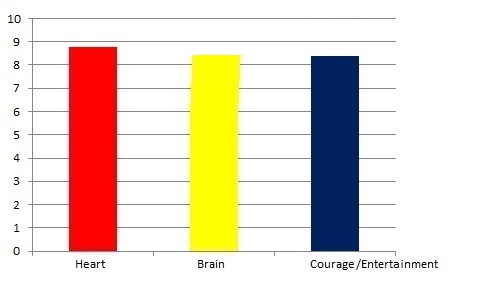 Hit the Road 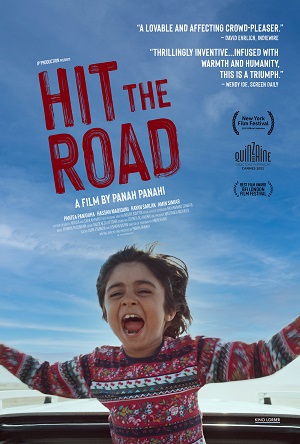 A family embarks on a road trip through Iran. The father (Hassan Madjooni) because he has a broken leg, so his older son (Amin Simiar) drives instead. His younger son (Rayan Sarlak) and wife (Pantea Panahiha) also join them for the ride along with their injured dog. Hit the Road is far from a conventional road trip comedy. Even to call it a comedy wouldn't really be completely accurate. The screenplay by writer/director Panah Panahi has a wafer-thin plot and keeps everything lean without any subplots or unnecessary exposition. As Roger Ebert once wisely observed, a plot, after all, isn't as important as how a film goes about its plot. The emotions that Panahi contains within the minimalist plot is what makes the film extraordinary. The characters are all nameless, but they feel more true-to-life than characters in Hollywood films that do have names. None of them come across as caricatures. They each have their own flaws which gradually rise to the surface, but what humanizes them even more is their different personalities. Fortunately, the dialogue sounds natural enough that you can believe that these people are a family. Their conversations are witty and amusing at times with some pop culture references to classic movies like 2001: A Space Odyssey. Some of the situations that the family goes through are quite funny, but Hit the Road doesn't try too hard to make the audience laugh or to push the envelope. The humor is human comedy and grounded in realism without resorting to the lowest common denominator, so those of you expecting poop or fart jokes will be disappointed. As Hit the Road progresses, it becomes increasingly engrossing, surprising and poignant without being schmaltzy or contrived. All of the actors in Hit the Road excel with their natural performances that help to further ground the film as a slice-of-life. Panahi avoids preachiness or anything that's heavihanded which is a testament to his restraint as a filmmaker. He does include some poetry both in terms of visuals and words, both of which are equally powerful. The last scene of the film, which won't be spoiled here, is breathtaking, tender and enormously moving. Its beauty and emotional resonance transcends words much the most of Hit the Road. Bravo to Panahi for seeing and treating these characters as human beings. At a brief running time of just 1 hour and 33 minutes, Hit the Road is a funny, genuinely heartfelt and captivating journey brimming with warmth, poetry and humanity. 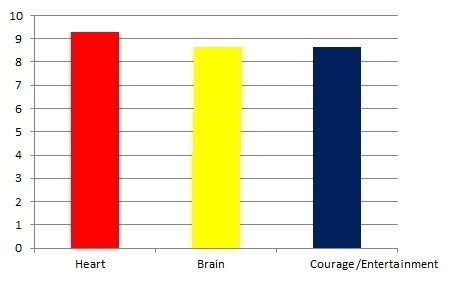 Marvelous and the Black Hole 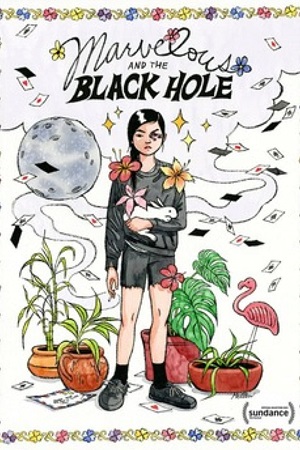 14-year-old Sammy (Miya Cech) lives with her father, Angus (Leonardo Nam), and older sister, Patricia (Kannon Omachi). They're all still in the process of grieving over the death of her mother, Sue (Jae Suh Park), but Angus has moved on to a new love of his life, Marianne (Pauline Lule). When Sammy's rebellious, delinquent behavior goes too far, he sends her to a community college to take a Small Business course for the summer. Her life changes after she meets and befriends Margot (Rhea Perlman), an older woman who works as a magician and convinces Sammy to be her assistant. Marvelous and the Black Hole deals with a lot of important topics that it tackles too breezily without going beneath the surface. Writer/director Kate Tsang should be commended for shedding some light on issues like grief, but sugar-coating Sammy's experiences with grief and not showing enough of her emotional pain makes for an underwhelming coming-of-age film. Tsang does grasp, though, that comedy is grounded in tragedy, but it takes a sensitive and organic screenplay to effectively blend tragedy and comedy. Sammy's father and sister each deal with grief in their own way too. Her father seems ill-equipped to take care of Sammy's emotional needs on his own, so Margot becomes like her surrogate mother and father rolled into one. Everything that happens in Marvelous and the Black Hole can be easily predicted which would've been fine if the screenplay weren't just going through the motions and trying too hard to be offbeat and whimsical. Margot seems like she's just as over-the-top as Maude from Harold & Maude, but her character never truly comes to life like Maude's character does. Moreover, Sammy's emotional journey and character arc feels contrived. Sammy seems like she's more like Enid from Ghost World in terms of her personality and rude behavior. Both she and Enid don't have a mother in their life anymore and have to deal with a neglectful father. Terry Zwigoff and Daniel Clowes do a much better job at depicting teen angst, alienation and depression honestly, unflinchingly and perceptively in Ghost World through more wit and insight, though. The attempts at humor often fall flat in Marvelous and the Black Hole and so do the attempts at poignancy. The performances are decent, especially Miya Cech and Rhea Pearlman's performance which does generate some heartfelt moments, but they're far and few between. It doesn't help that they're undermined by the stilted, mostly shallow screenplay that fails to bring their characters to life, so the modicum of emotions in the film comes from their performances, not from the screenplay. Unfortunately, the bond of friendship between Sammy and Margot isn't palpable enough, and the same can be said about Sammy's relationship with her father which remains under-explored. The pace moves too quickly at times and doesn't slow down to breathe life into the film as though it were in a hurry to get to the uplifting ending. By the time it reaches its uplifting ending, it doesn't really earn its uplift or make enough of an emotional impact to rise above mediocrity. Marvelous and the Black Hole, at a running time of just 1 hour and 21 minutes, is mildly engaging, but often clunky, uneven, sugar-coated, and ultimately undercooked. 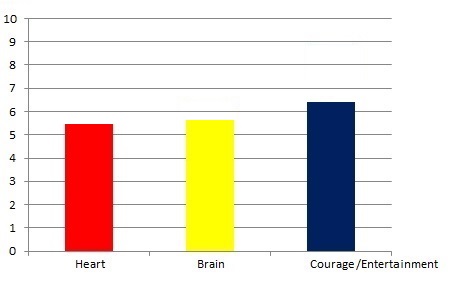 The Northman 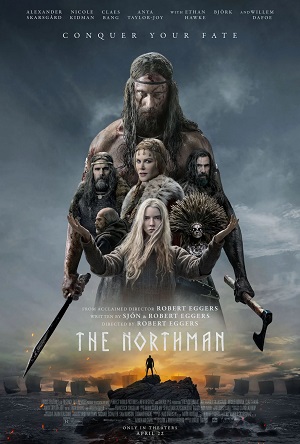 During his childhood, Prince Amleth (Oscar Novak) witnesses his uncle, Fjölnir (Claes Bang), kidnap his mother, Queen Gudrún (Nicole Kidman), and kill his brother and his father, King Aurvandill (Ethan Hawke). Years later, Amleth (now played by Alexander Skarsgård) is hellbent on seeking revenge on Fjölnir and on rescuing his mother. He embarks on a quest to find and confront Fjölnir. During his journey, he meets Olga (Anya Taylor-Joy), a sorceress/Slavic slave who joins forces with him. Just based on the premise alone, The Northman sounds like it could be a epic, thrilling, gripping Vikings revenge tale. Unfortunately, the screenplay writer/director Robert Eggers and co-writer Sjón don't do that premise any justice because they forget to develop any of its characters which makes the film feel more like a video game than a movie. The plot is pretty straight-forward, but it seems like it's merely an excuse to move on to the next action sequence of which there are many. Eggers and Sjón deserve praise for showing plenty of physical grit and unflinching gore, but they don't include nearly enough emotional grit. Is nuance too much to ask for? The relationship between Prince Amleth and Olga falls flat because there aren't enough scenes to expand on their relationship beyond the fact that they've teamed up to fight together. Also, between all the intense action, there's virtually no levity or comic relief. Even The Green Knight, which is far superior to The Northman on many levels, had a little bit of levity. The bombardment of action scenes soon becomes tedious and monotonous with diminishing returns when it comes to suspense and thrills. Exhaustion is no fun. What's wrong with stopping to get to know these characters for a change as human beings? If the filmmakers don't treat them as human beings, how is the audience supposed to see them as human beings or to care about them as human beings for that matter? That makes the third act lack the powerful emotional punch and catharsis that it tries to achieve. The only relief is that the end credits have finally arrived. Alexander Skarsgård gives a fine performance as Prince Amleth and brings some charisma to his role as does the always-reliable Anya Taylor-Joy. It's too bad, then, that the screenplay doesn't provide enough of a window into their characters' heart, mind and soul because they barely get a chance to shine and display their wide range of acting skills. With no inner life to these characters, the actors don't really have enough to work with beneath the surface. Nicole Kidman is miscast and gives a cold, emotionally distant performance as the Queen. On a positive note, The Northman's major strengths are its exquisite production values. Everything from the costume design, makeup, set design, lighting, camerawork and the sound design bring plenty of style to the film that also makes it very cinematic. The impact of those production values would be diminished on the small screen. Sometimes style can become part of a film's substance and even compensate for the lack of a substance, but that's not the case here. Fundamentally, The Northman has a fair share of eye and ear candy, but it neglects everything else in between. At a lengthy running time of 2 hours and 16 minutes, which feels more like 3 hours, The Northman is a visually stunning, but vapid, tedious and exhausting video game.
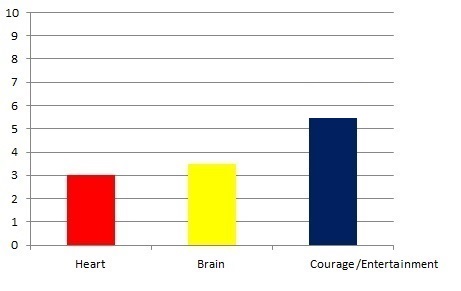 Saturday Fiction 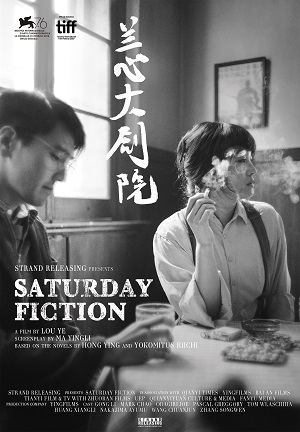 In 1941, Yu Jin (Gong Li), an actress, travels to Shanghai to perform in a play called "Saturday Fiction" for theater director Tan (Mark Chao), her former lover. She has a secret double life as a spy working for the Allies while the Japanese occupy the country. Japanese authorities arrest her husband (Zhang Songwen) and throw him in prison, so she hopes to get him released. Speyer (Tom Wlaschida), the manager of the hotel that Yu Jin stays at, helps her to achieve that as long as she's able to abduct Furuya (Joe Odagiri), a Japanese agent, to find out what the Japanese are secretly up to. Saturday Fiction has a premise that sounds like it could be a taut, intriguing crime thriller like Allied or Wife of a Spy. To compare it to Casablanca wouldn't be fair despite the temptation because it doesn't even come close to achieving that level of exhilaration. The screenplay by Yingli Ma has so many twists and turns and double crossings that it makes it hard to trust any of the characters or to know for sure what to expect next. The plot often feels convoluted with too many characters none of whom are particularly memorable or interesting. There's nothing wrong with complexity, but without well-writing exposition and knowing when to trust the audience's intelligence and when not to, it leads to a convoluted plot. The Outfit is an example of much more gripping and intriguing thriller that's complex without being too confusing while it also offers lots plot twists. Also, there's not nearly enough comic relief which would've helped to enliven the film a little and help it to avoid becoming monotonous. The filmmakers don't invest enough time exploring the relationships between the characters; they're too concerned about moving on the the next plot twist. What about providing some space for the audience to be emotionally invested in the story? How can the audience care about what happens to Yu Jin if they don't get to know her more. It seems as though the characters are there as mere pawns for the plot, so they fail to come to life. That said, at least Saturday Fiction doesn't become as dry, dull and confusing as Tinker, Tailor, Soldier, Spy, but it does come close. The black-and-white cinematography adds some style, but not much substance. It's not exquisitely shot nor are the action sequences all that exciting once they do arrive. When it comes to the performances, they're pretty good, especially Gong Li who oozes with charisma, but they're all undermined by the shallow, lifeless screenplay. At an overlong 2 hours and 4 minutes, Saturday Fiction is a lackluster, convoluted and underwhelming crime thriller low on palpable thrills and suspense. 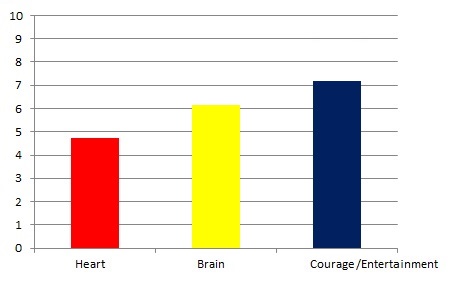 Stanleyville 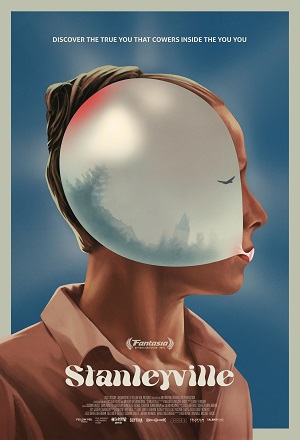 Maria Barbizan (Susanne Wuest) leaves her boring job and family to participate in a bizarre contest with five other contestants, Andrew (Christian Serritiello), Manny (Adam Brown), Bofill (George Tchortov) and Felicie (Cara Ricketts). The game's host is the enigmatic Homunculus (Julian Richings), and the grand prize is a slightly used car. Writer/director Maxwell McCabe-Lokos and co-writer Rob Benvie set the dark comedy tone within the first few minutes as a bird crashes into the window of Maria's workplace building. The significance of that scene becomes more apparent later on. The filmmakers don't bother to include much exposition or even to show much of Maria's life at home with her husband and daughter. They waste no time getting right to the meat of the story: the contest itself. Why were these 5 contestants selected in particular? Was it random or was there a reason? Those are among the questions that the film does eventually answer, but if you're trying to figure out who Homunculus is or to learn about his backstory, Stanleyville comes up short. The same can be said about the contestants who do have different personalities, but they don't really feel like fully-flushed human beings. If the filmmakers were to spend more time getting to know Maria and the other contestants, it would've been easier to root for one of them. That said, the games within the contest get pretty dark, absurd and wickedly funny. Maxwell McCabe-Lokos and Rob Benvie are unafraid to show the dark side of human nature and how selfish people can be. More exposition would've helped to make the film much more compelling, though, because by the time the end credits roll, you'll end up with many more questions than answers. Sometimes leaving a lot of room for interpretation becomes more frustrating than fun which is the case with Stanleyville. The performances are fine all-around, but none of the actors get a chance to rise above the shallow screenplay. They have pretty good comedic timing, though, so at least there's that. It's too bad that the screenplay doesn't flesh out their relationships or give them any banter to work with; that would've helped to make the film at least a guilty pleasure. There's nothing outstanding about the production values or cinematography, so style isn't among Stanleyville's strengths either. If it were campy and even more over-the-top, it could've been as wildly entertaining as something like Death Race 2000 or The Hunt. At a running time of 1 hour and 28 minutes, Stanleyville is an often inert, toothless dark comedy that remains too low on laughs, wit and exposition. 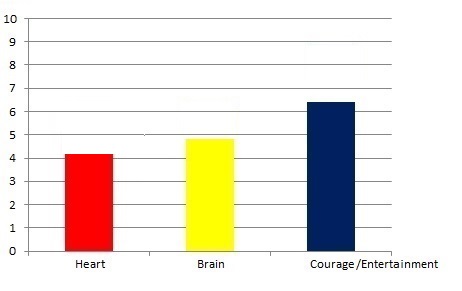 The Unbearable Weight of Massive Talent 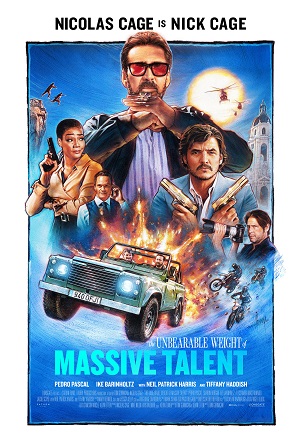 Nick Cage (Nicolas Cage), an alcoholic, washed-up actor, hasn't found a major acting role to pay his bills in a while. He has an ex-wife, Olivia (Sharon Horgan), and daughter Abby (Lily Sheen), who he struggles to connect with. His agent Richard (Neil Patrick Harris) arranges for him to fly to an island in Spain to attend the birthday party of Javi Gutierrez (Pedro Pascal), an arms dealer. Little does Javi know that two CIA agents, Vivian (Tiffany Haddish) and Martin (Ike Barinholtz), hire Nick to help them on a secret operation to find the President's daughter whom Javi might have kidnapped. . The screenplay by writer/director Tom Gormican and Kevin Etten begins as a dramedy about an actor stuck in a rut and battling his inner demons before it veers into an often action comedy once Nick arrives on the island. The tongue-in-cheek humor works, for the most part, but it eventually gets repetitive and tiresome. The innate struggles of Nick Cage could've been enough to keep the plot engaging if it were a character study. The filmmakers, instead, focus more on the B-movie elements that will please fans of Nick Cage who love Face/Off, Wild at Heart, Gone in Sixty Seconds and Con Air, among others. Cage is more than capable of handling drama like in Leaving Las Vegas and The Family Man, but this film doesn't really delve too deeply into Cage as a human being. The subplot involving Nick Cage's relationship with his daughter feels tacked-on. It's more concerned about being a wild action comedy while providing some self-referential commentary about the big action and twists needed to turn a movie into a blockbuster which would make it like every other sausage in Hollywood's sausage factory instead of taking risks. Cage even says at one point that he hates movies that have two characters just talking to each other because there has to be something to move the plot forward. Cue a suspenseful scene that occurs right after he says that. There are some twists, but they're mostly silly, dumb and contrived. Of course, there's plenty of Easter Eggs for Nick Cage fans to find, although the film dumbs things down a bit by citing the film references at times. Why not trust the audience's intelligence. Nick's id pops up a few times which adds some much-needed clever zaniness which includes a hilarious kiss that provides the film's biggest laugh. Nicolas Cage gives a great performance as, well, himself. He's clearly having a lot of fun with his role and remains convincing even during the too-brief heartfelt moments. Pedro Pascal is also terrific and has palpable chemistry with Cage. The scenes when their characters bond with one another and banter are among the best parts of the film. The pace moves briskly enough at least so that there's rarely a dull moment even when the jokes don't land as much during the last 30 minutes. At a running time of 1 hour and 45 minutes, The Unbearable Weight of Massive Talent could've been bolder and funnier or more profound, but it's funny enough to be a harmless, mindless slice of entertainment. 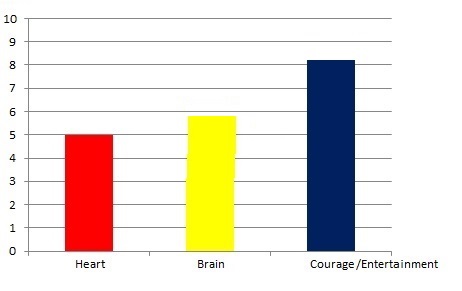 The White Fortress 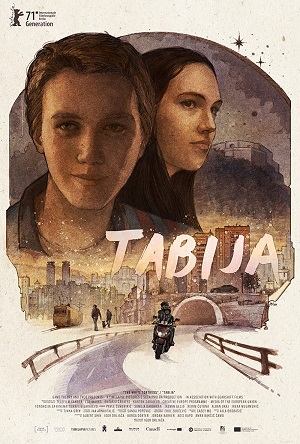 Faruk (Pavle Cemerikic), a teenager, lives with his grandmother (Irena Mulamuhic) in a poor neighborhood of Sarajevo. He struggles to make a living selling scrap metal and joins his friend, Almir (Kerim Cutuna), to work for a mob boss Cedo (Ermin Bravo) who's involved with sex trafficking local women. At an outdoor shopping mall, he meets and flirts with Mona (Sumeja Dardagan), a 9th grader who comes from an affluent hom. He gives her his phone number in hope that he can groom her into being one of girls that Cedo will bring into the sex trafficking world. Mona texts Faruk in class one day and they agree to meet up. Gradually, they start falling for each other and, soon enough, he's torn between his life of crime and his newfound love. The White Fortress is The screenplay by writer/director Igor Drljaca has a plot that seems simple on the surface, but it becomes increasingly complex and even surprising. Faruk and Mona come from different socio-economic backgrounds, yet they get along with each other. In a way, they're both trapped in a prison without bars and yearn to escape from it even though they're not emotionally mature enough to know how to. They're also both lonely and don't have anyone to really talk to in their lives. Faruk's friend, Almir, is far from a good influence or a good role model. Fortunately, the romance between Faruk and Mona feels true-to-life without any cheesiness or maudlin scenes. You learn just enough about what their lives are like to get to know them as human beings. Is their love real and true? Is it sustainable? Or are they just two naive teenagers? Kudos to writer/director Igor Drljaca for not judging them or anyone else in the film. The only character closest to a villain is Cedo, but the film isn't really about him or about the sex trafficking industry. The White Fortress could've easily become a dark, gritty suspense thriller, but instead it takes the less easy route by exploring the dynamics of the relationship between Faruk and Mona while humanizing them in the process. Pavle Cemerikic and Sumeja Dardagan both give very natural, raw and convincingly moving performances that breathe even more life into their roles. They have great chemistry together, and you can feel the connection between Faruk and Mona from the very beginning which makes it easier for you to root for them to be together. The third act, like much of the film, doesn't offer any easy answers or wrap everything up nearly in a bow-tie for that matter. Without revealing any spoilers, it's a poignant and haunting ending that will linger in your mind for a long time. It also includes some visual poetry as well as poetry through words which adds both style and substance to the film. Poetry is often a form of protest for or against, so in this case, the film is a protest for love and against hate. That's a vital and profound message to send to the audience, but Drljaca sends it in a way that avoids preachiness and heavy-handedness. At a running time of just 1 hour and 28 minutes, The White Fortress a tender, bittersweet and genuinely heartfelt love story. 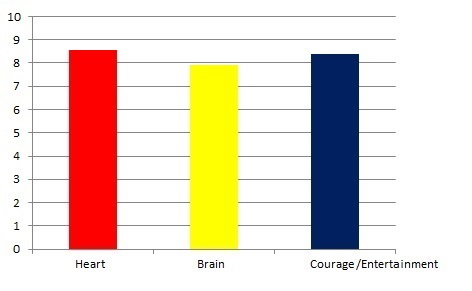 Y Cómo Es Él? 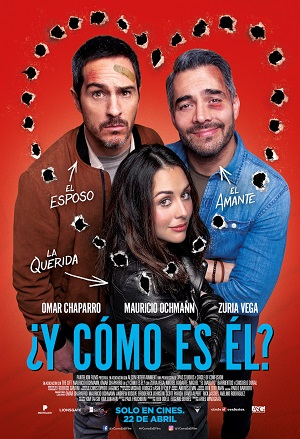 When Tomás (Mauricio Ochmann) discovers that his wife, Marcia (Zuria Vega), has been cheating on him with Jero (Omar Chaparro), a cab driver from Puerto Vallarta, he travels there to confront him while telling his wife that he's staying at a hotel for a job interview. He ends up injured in the back of Jero's cab while Jero has no idea that he's the husband of Marcia. Jero patches up Tomás' wound and convinces him to let him drive him all the way to Mexico City. Meanwhile, a thug Jero owes money to hunt him down. Y Cómo Es Él? is a screwball black comedy mixed with a little bromance. The screenplay by Paul Fruchbom becomes increasingly preposterous and silly, but nonetheless amusing as long as you check your brain at the door. The blend of action and comedy mostly works with some pretty zany scenes. The subplot involving the thugs who Jero owes money to seems tacked-on as though it were just there to make the film more Hollywood when there's already enough conflict with the main story. The relationship between Tomás and Jero is part of what makes the film so engaging because it's interesting to see in what direction their relationship will go. They're just as amusing to watch as Felix and Oscar in The Odd Couple. Not surprisingly, director Ariel Winograd made another film with characters who are opposites called Tod@s Caen, a very witty, clever and funny romantic comedy. Y Cómo Es Él? doesn't quite reach the hilarity, wit and cleverness of that film, but it has enough funny scenes to be a mildly engaging B screwball action comedy in the vein of 8 Heads in a Duffel Bag, The Hangover and Very Bad Things. The third act is very contrived and can be predicted from a mile a way, but at least the film avoids becoming cheesy with its happy ending that does seem like a bit of a fairy tale and make you question why Tomás would even want to get back with his wife after she cheated on him. The final shot before the end credits roll, which won't be spoiled here, leaves just enough room for the audience to use their imagination and to connect the dots own their own. Mauricio Ochmann have great chemistry together which helps to keep the audience entertained. Their characters' banter and rapport is often amusing to watch, and how they become friends with each other feels surprisingly heartfelt. They even have more chemistry than Tomás and Marcia do. The pace moves along briskly enough, and the action scenes are fine, but not exceptionally shot. This film is just as bonkers, inane and forgettable as The Unbearable Weight of Massive Talent which it would pair well with. If you're looking for road trip movies that are very different and more profound, try pairing it with Drive My Car or Hit the Road which would make it an odd couple when paired with Y Cómo Es Él?. 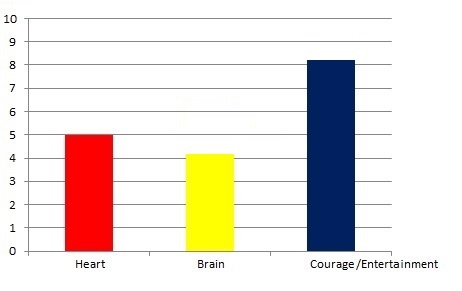 |